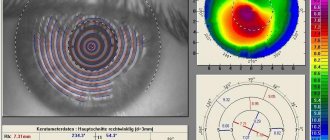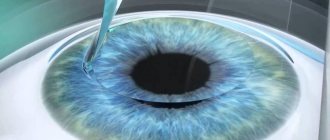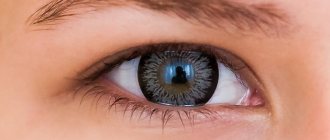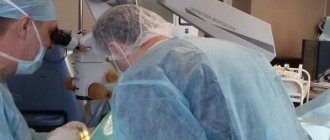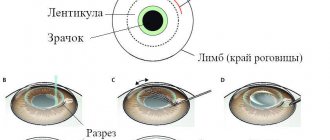“Just before the New Year, I had laser vision correction and got rid of glasses, hopefully for the next couple of decades,” says Olga Kashubina, medical journalist, author of the ShBmnk telegram channel, a graduate of the Krasnoyarsk State Medical University.
Source: Zozhnik
Today this operation will not surprise anyone - many of my friends had this done a few years ago, others are thinking about it in the near future. There are dozens of clinics in Russia offering to get rid of myopia, farsightedness or astigmatism in a few minutes (and several tens of thousands of rubles). But the benefits, risks and consequences of such operations are not obvious to everyone.
Benefits of laser vision correction
Why do so many people still prefer laser correction to glasses and lenses? Patients who have undergone surgery cite many arguments in favor of the procedure. Let's look at them all in order.
Speed
Any laser vision correction procedure lasts less than 10 minutes for both eyes. The immediate operating time of the new TENEO 317 laser is only 2 seconds per 1 diopter! That is, in 20 seconds you can remove −10 myopia!
All manipulations, including preparation, the operation itself and post-operative rest, take no more than an hour and a half. Normal vision returns immediately after surgery. After which the patient goes home independently. To be fair, it is worth noting that in the first hours there may be unpleasant sensations in the eyes and discomfort, lacrimation and slight fogging, but all this usually goes away after 3-4 hours, vision becomes clear.
Painless
Thanks to anesthetic drops, the patient does not experience pain or discomfort during laser correction. However, it is important to remember that any operation is stressful, so discomfort may arise unconsciously on an emotional level.
Efficiency
The operation allows you to completely restore vision or significantly improve its sharpness. We have performed thousands of successful operations and can claim that in most cases the laser completely corrects refractive errors caused by astigmatism, myopia and farsightedness.
Safety
Statistically, the risk of eye infection when wearing contact lenses is much higher than when undergoing laser correction. In addition, in our clinic we use modern consumables that guarantee sterility and sanitary and epidemiological safety. Surfaces are disinfected multiple times throughout the day.
Affordable price
Today, laser vision correction is a very affordable and popular operation. Of course, the cost cannot be compared with going to the supermarket, but a new iPhone is definitely more expensive than surgery on both eyes. In addition, regularly ordering contact lenses over several years or buying glasses with expensive frames will almost certainly not cost any less.
Minimal restrictions after the procedure
The busiest patients choose LASIK HD, since this operation practically does not disturb them from their usual schedule. Vision is restored quickly (for comparison, recovery after PRK lasts longer - up to 7 days), so there is no need to take a vacation or several days off from work. Doctors usually recommend limiting visual stress for 1-3 days and physical activity for 10-14 days. After the operation, a certificate of incapacity for work is issued for 2-3 days.
LASIK and SMILE
SMILE appeared only 4 years ago, so it is possible to compare the effectiveness of methods only over a short distance. In a nutshell, there is no difference between LASIK and SMILE in terms of safety or effectiveness, but after SMILE, patients recover a little faster and are less likely to suffer from dry eye syndrome. (But the price of SMILE is about 1.5-2 times more expensive than LASIK - Zozhnik’s note).
In fact, the new method is less traumatic for the cornea, so it can be assumed that the risk of delayed complications will also be lower. But it’s too early to guess. You can read more here and here (in English).
And here a nice guy explains the essence of LASIK and SMILE operations on video (there are subtitles):
By the way, the world's first successful laser surgery to treat myopia was carried out in the Soviet Union. This happened more than 40 years ago, and her technique is constantly being improved. However, some patients are confused by the fact that many ophthalmologists are in no hurry to say goodbye to glasses, and some even dissuade their patients from interventions of this kind.
Contraindications and restrictions
There are a number of contraindications that exclude the possibility of such an operation: various eye diseases, as well as general systemic diseases, for example, cancer, rheumatoid arthritis, diabetes, etc. Laser vision correction is not performed on nursing and pregnant women.
In addition, it is not advisable for laser correction to be performed on children under 18 years of age and adults over 45 years of age (but in some cases, according to indications, the operation is performed up to 65 years of age). In all cases, the decision to perform an operation is made individually by the ophthalmologist.
Discomfort after surgery
After the procedure, some patients complain of a halo effect, double vision, poor night vision, and dry eye syndrome. Such unpleasant sensations appear extremely rarely and, as a rule, disappear in the first few days after surgery. The doctor warns you about this in advance at the appointment before the operation.
In other cases, these sensations are not associated with the effects of the laser, but with relative contraindications that the patient has. In such a situation, the doctor warns the patient in advance about possible risks.
Postoperative care
Immediately after vision correction, patients sometimes feel slight discomfort: burning, itching, watery eyes and dryness. These sensations disappear a few hours after LASIK, but after PRK they persist for several days. Don’t be afraid of this - the ophthalmologist will prescribe drops that will compensate for the lack of tears and relieve unpleasant symptoms.
No guarantee for duration
“Lifetime” tricks are quite often used in the computer and component market, but recently many clinics that are trying to sell an expensive service have begun to resort to this technique. The patient is emotional and falls for this successful marketing ploy...
It is impossible to say with one hundred percent certainty that the effect of the operation will last a lifetime. In the vast majority of patients, vision is completely restored for decades, but in rare cases, deterioration may occur again after a few years.
To be fair, we note that statistically in 98% of cases, laser vision correction still remains the most effective way to restore vision.
Laser correction: indications and contraindications
The indication for surgery is myopia, farsightedness or astigmatism. Depending on the degree of the disease and the individual characteristics of the patient, the optimal treatment method is selected.
The operation is not recommended for pregnant and lactating women, as well as for patients under eighteen years of age.
Absolute contraindications include:
- high intraocular pressure;
- cataract;
- small thickness of the cornea (since we have SBK Lasik technology, we can take corneas from 370-380 microns);
- acute inflammatory eye diseases;
- retinal detachment after surgery;
- complex chronic diseases;
- progression of myopia;
- persistent or temporary mental disorders;
- addiction (alcohol, drugs).
Is it always possible to restore vision completely?
It is not always possible to achieve 100% vision, for example, with high degrees of refractive error. In this regard, some patients will still have to wear glasses or lenses with smaller diopters. The best results occur with myopia: in most cases, the laser completely restores vision. With farsightedness, near vision acuity continues to deteriorate with age, so over the years, such patients, even after laser correction, will need glasses for near vision.
All forecasts regarding the results of laser vision correction surgery for a particular patient can only be determined by a doctor after a complete diagnostic examination.
Frequently asked questions about laser vision correction
Statistics show that the vast majority of people with poor vision prefer glasses and contact lenses.
However, the same statistics indicate that among those who have had laser vision correction, there are practically no dissatisfied with the result.
Leave your phone number. The clinic administrator will call you back.
Make an appointment
Appointment with an ophthalmologist
1550 rub.
Is it necessary to have laser vision correction?
It is difficult to imagine any other method that gives such a quick result and such a tangible result for the patient as laser vision correction! At the same time, a large number of repeated questions during the appointment served as a reason to try to dispel misconceptions about the LASIK method. We will try to answer them, focusing on the key points of LASIK and what you should find out at an appointment with an ophthalmologist first of all, making a final decision about the need for surgery.
Why don’t people make a correction that allows them to see well without depending on glasses and contact lenses? We tried to find out and asked our patients at their appointment: why haven’t you had your vision corrected yet?
The main answers were as follows:
“I don’t know anyone who has made such a correction. If only there were, then I would have thought”
If you decide to undergo surgery and want to talk with a patient who has already undergone it, we are ready to provide you with this opportunity. It is quite understandable that a person wants to hear everything “from the first person.” Most often, of course, people come to the appointment who have not just heard about the LASIK technique. Their friends, distant or close acquaintances have already corrected their vision themselves. And a good result from those people whom we know personally is the best recommendation. Maybe this is why the number of corrections carried out increases very significantly from year to year. In America alone, the year before, about one million corrections were carried out, and last year - already one and a half. Among the employees of our clinic there are also those who have undergone this operation.
“The method, in my opinion, is not yet very proven. Nobody knows what will happen 10 years after such a correction.”
This is a wrong opinion. In fact, the first excimer correction using the PRK method was carried out in 1985, using the LASIK method (laser in situ keratomileusis) - in 1989. And keratomileusis itself (without the use of a laser) appeared back in 1948, that is, more than 50 years back. Therefore, now we can talk about long-term results and a large amount of clinical data.
“Even if I made a correction, it would be abroad. I don’t trust our clinics”
You will probably be surprised, but now there is a reverse trend. For quality ophthalmological care, people come to us, to Russia, including Krasnoyarsk. Moreover, among them are citizens of European countries and America, where the average level of medical care is quite high. What's the matter? The decisive factor here is the experience of our specialists. Methods, equipment, service - all this is not inferior to world standards. But in a small private European or American clinic, the doctor does not have such a wide practice as ours. And an ophthalmic surgeon must constantly operate, just as a pianist must constantly play. This is the key to a good result. And patients understand this very well.
“I heard that after the correction, after some time, vision will still deteriorate. Why do it then?”
The result of the excimer laser correction itself does not change over the years. Of course, if you really have myopia, farsightedness or childhood astigmatism, and not a disease with similar symptoms. At the appointment, much attention is paid to the accuracy of diagnosis, which identifies such cases. If, in the absence of all contraindications, you made such a correction at the age of 20, then at 25, and at 30, and at 35, your vision will remain good. What the procedure does not protect against is changes in near visual acuity after age 40. There are other mechanisms at work here; they are associated with age-related changes in the lens of the eye.
"This will hurt"
Each of us is afraid of pain and does not want to experience it. Laser vision correction is a gentle, effective and virtually painless method of vision correction. Unlike old methods, modern technologies have overcome the “pain barrier” and make it possible to carry out the laser correction procedure under local anesthesia with eye drops, which is more easily tolerated by patients of all ages. In addition, it does not put stress on the heart, blood vessels and other organs. After the operation, for several hours there may be unpleasant sensations, as if “something got into the eye”, increased lacrimation, etc. However, they pass during the day. It all depends on the individual characteristics of the body.
“Maybe I would have done it, but I don’t have time.”
The operation itself will not take much of your time: it is performed on an outpatient basis. Time for both eyes is about 15 minutes. As a rule, after just a few hours a person gains the ability to see much better than before. Many people can watch TV already on the day of correction. You can return to active visual work - for example, at a computer - in 2-3 days. Excimer correction using the LASIK technique is ideal for busy people; they will not need to be distracted from their work for a long time. And, by the way, good vision saves a lot of time and effort.
“I’m afraid that they will want to make money from me and perform an operation, even if it doesn’t suit me.”
This is absolutely impossible. Before the procedure, the patient must undergo a complete eye examination. This allows you to accurately determine what is causing poor vision and identify possible contraindications, that is, to understand whether this technique is suitable for the patient. Experience shows that it is indicated for approximately 70% of people. If for one reason or another excimer laser correction cannot be done, there are a number of other techniques that can improve vision. This could be lens replacement surgery, corneal surgery, etc.
One way or another, in the life of a person with refractive errors (myopia, farsightedness, astigmatism), situations may often arise in which there is a need to increase visual acuity. These are production requirements, a sports lifestyle, intolerance to contact lenses, and simply the desire to improve the quality of life. What most often worries patients who want to undergo laser vision correction? We answer the most frequently asked questions.
“Is it possible to give birth independently after LASIK or will a caesarean section be required? Maybe it’s better to do the operation after childbirth?”
You can safely have the operation whenever you wish; the result of the operation does not affect the course of pregnancy and childbirth in any way. The only limitation is that it cannot be performed during pregnancy and breastfeeding. The mode of delivery is affected only by retinal conditions, and to evaluate this we perform a full diagnostic examination. If the retina is healthy, it will be recommended to give birth naturally, but if any problems are identified, the doctor will recommend how to avoid eye complications during childbirth.
“Why do ophthalmologists wear glasses and not do laser correction?”
This is not entirely true. Ophthalmologists perform surgery on themselves. Moreover, according to statistics, the number of such operations in European clinics alone has increased by 30% over the past year. However, we should not forget that there are contraindications and age restrictions for LASIK: the recommended age for the operation is from 18 to 40 years. Until the age of 18, the body is still developing, and as the eyeball grows, vision may change. After 40 years, correction is possible, but you need to remember that it does not eliminate the appearance of age-related farsightedness (presbyopia). Contraindications to excimer laser correction: pregnancy, breastfeeding, severe diabetes mellitus. Correction is also not carried out for some eye diseases (corneal degeneration, keratoconus, glaucoma, iridocyclitis, retinal detachment, etc.) and some general diseases (endocrine and systemic). If the ophthalmic surgeon you see uses glasses, ask him why. Most likely, he will give you one of the above reasons.
“Can LASIK be repeated and how many times?”
In some situations, indeed, there is a need for additional correction, that is, repeated LASIK, for example, with high degrees of astigmatism. As practice shows, a single additional correction is sufficient. Theoretically, the operation can be done repeatedly, provided the cornea is sufficiently thick. This indicator is individual for everyone and is determined during the initial diagnostic examination. Too thin a cornea is one of the absolute contraindications for surgery.
“Is it possible to lead an active lifestyle and play sports after surgery?”
Certainly. After all, this is precisely why you do it! After the operation, you need to adhere to certain recommendations for some time, after which you can lead an active lifestyle and engage in any sports.
“What happens if the laser “misses”?”
During the treatment process, the laser cannot “miss” since the position of the eye is fixed with a special vacuum ring, and the head is fixed with a pillow. The laser is equipped with a tracking system for the position of the pupil and the pattern of the iris, so if there are sudden movements of the eye, if this happens, the laser immediately stops its operation. Minor movements of the eye do not affect the result, since the laser beam, controlled by the homing system, is deflected following the eye and continues to affect the desired area of the cornea.
“What happens if the power goes out during surgery?”
If such a situation happens (which is very unlikely), then in our clinic the power supply of the laser unit will be reconnected to the uninterruptible power supply. Not only devices will be connected to it, but also a system for ensuring safe conditions in the room for correction. This will allow for a truly complete correction on both eyes, without any violations of technology.
“What is the cost of the upcoming operation?”
The cost of LASIK surgery may vary according to its complexity, the level of experience of your surgeon, and the type of technology and excimer laser used. In Europe and America, LASIK surgery for one eye costs an average of $1,500. You should be wary of cheap offers for laser vision correction, because... This technique involves the involvement of highly qualified labor of a team of specialists, disposable consumables, and the use of expensive equipment and tools.
Answers to frequently asked questions
I decided to have laser vision correction. Which technique should you choose?
We work with several effective methods of laser vision correction. The most popular today is LASIK HD, but do not forget that choosing the optimal technique is an individual matter. Our specialist will help you choose the best option that suits you. Much depends on the characteristics of your vision, the presence of pathologies and the degrees of their development. For patients with thin corneas, one correction option is offered, for people with presbyopia - another. Get diagnosed at our clinic, and the doctor will tell you which option is right for you.
How long will it take me to recover after surgery?
Normal vision will return to you immediately after surgery. After a few hours, the discomfort, if it arises at all, will disappear. After 2-3 days you will be able to return to your work. However, it is not recommended to engage in sports and heavy physical labor for 10 days, and it is also undesirable to subject the body to heavy stress during this time.
What is the likelihood of complications occurring?
Our doctors try to accept for surgery only those candidates who are definitely suitable for laser correction without causing unpleasant side effects. If a person has diseases that can affect the results and cause complications, the ophthalmologist always warns about this. We want patients to understand the possible consequences and make decisions only after weighing all the risks.
I am not an ideal candidate, but I want to have laser correction. What to do in such a situation?
It is important to choose a reliable and well-equipped clinic, as well as a doctor who has many successful operations under his belt. In our clinic, laser correction is performed by some of the best doctors not only in the city, but throughout the Krasnoyarsk Territory, and the excimer laser allows us to take into account all the parameters of the eye. Therefore, we operate even on complex cases, warning in advance about possible risks, if any.
Disadvantages of laser treatment
The procedure is not recommended for children and people over 45 years of age. This limitation is due to the fact that in childhood the visual organ continues to grow, so it is quite difficult to predict the result. Although there are exceptions that allow laser correction for children over 10 years old. More detailed information can be obtained during a consultation with a pediatric ophthalmologist. It is worth knowing that laser correction does not protect against age-related farsightedness, which occurs after 45 years. Medinvest specialists recommend undergoing an annual vision test.
Make an appointment with an ophthalmologist
Qualified doctors at our clinic are waiting for you for a consultation and are ready to conduct a full diagnosis of your vision! We have advanced equipment and enormous experience, which allows us to restore vision and maintain health to thousands of patients every year.
Along with vision, self-confidence returns, the ability to calmly engage in active sports, without fear of losing or breaking glasses. Give yourself freedom and enjoy life without restrictions!
Which laser correction method should I choose?
There are several types of laser vision correction. Thanks to this diversity, it is possible to treat ophthalmological diseases in patients with a wide variety of characteristics of the body and even lifestyle. For example, with a thin cornea of the eye, it is better to use Femto Lasik or ReLEx SMILE, and for patients with professions in which there is a risk of mechanical damage to the eyes, doctors recommend surgery using the PRK method. If you are a driver and want to see perfectly both day and night, without suffering from glare and halos, then you need Super Lasik or Femto Super Lasik.
Laser correction at Dr. Belikova’s Eye Clinic is performed only by experienced doctors with extensive experience. Our ophthalmic surgeons monitor the emergence of new treatment methods and approach each patient carefully. Many operations are performed personally by the head physician of our clinic, Elena Ivanovna Belikova.





